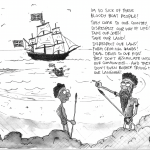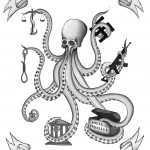Say what? You mean the very same Captain Jack Sparrow that just had his dogs deported from Australia whilst filming the latest Pirates of the Caribbean?
Yup, that’s right… The character from the über successful Hollywood franchise was based on a real life Muslim pirate from the 17th Century AD.
The real Jack Sparrow was actually named John Ward, but sailed under ye olde salty sea dog name of Jack Ward or Birdy (so gangsta!). He was originally a fisherman from Southeast England, but became a privateer in 1588 after the failed invasion of England by the Spanish Armada. What the hell is a privateer I hear you ask?! Good question. As a privateer young Jack was allowed to legally plunder Spanish ships, and pretty much take whatever he wanted from them, whenever he wanted to. He was a legal pirate, he even had an official plunderers license from her Majesty, Queen Elizabeth the 1st… Now that’s what I call posh pirating.
Once the war had ended and the new King of England (James the 1st) took the throne, the privateers quickly went out of business. They either gave up their license to legally plunder, or became peg legged, eye patch wearing, parrot wielding pirates, who sailed the seven seas in search of riches… “Arrrrggggh! Ye scurvy bilge rats!” Or something like that.
Not our Jack though, he went back to being a simple fisherman… well, for a little while at least.
Whilst minding his own business, catching a fish or two, Jack was then forced into joining the Royal Navy. Aint nobody got time for that! It wasn’t exactly what he had in mind in terms of career choice, so he and a small band of comrades quickly took matters into their own hands and deserted. The rag tag band of brothers stole a small ship and set sail for the high seas to live the life of fortune seeking pirates. Jack’s new crew elected him as their fearless captain, which is pretty dammed cool if you ask me and is possibly one of the earliest precedents for pirates choosing their own leader. #PirateDemocracy

This is the closest I could find to something that may have looked like Captain Jack “Birdy” Ward… It’s probably someone more famous, like Blackbeard, but whatever… Close enough.
They soon upgraded their humble little ship by capturing a much nicer one… Which they then used to overthrow and ship-jack an even bigger French vessel.
After a short ship upgrading spree and some more scurrilous pirate-like behaviour, Jack finally upgraded to a huge 32 gun warship, which he ironically called The Gift. They set sail for Tunisia to join the campaign against the Spanish and their nasty ongoing inquisition.
Once they arrived, Jack’s appetite for cheap rum was replaced with water as he and his entire crew embraced Islam and became Muslim. #CreepingSeventeenthCenturySharia
His awesome seafaring prowess soon saw him become the commander of over five hundred Muslim and Christian volunteers during his ongoing campaigns against the Spanish. He quickly became known as the Master of the Mediterranean and had numerous ballads written about him, some even taunting the King of England. Lets face it, he was basically the Kanye of his time, but without being a total douche bag about it.
“Go tell the King of England, go tell him this from me,
If he reign king of all the land, I will reign king at sea.”
During his time as Master of the Mediterranean he played an important role in rescuing thousands of Spanish Jews and Muslims who had to flee their homes during the expulsion of their lands by the Spaniards.
After becoming Muslim he changed his name to Yusuf Reis, but it was rumoured that during his earlier days he had a few nicknames. Our mate Jack was totally obsessed with little birds, so much so that the locals in Tunisia nicknamed him Jack Asfour, which means bird in Arabic. hence the name Jack Birdy, which became the character we know him as today, Captain Jack Sparrow.
So next time you sit down with your overpriced cinema popcorn, choctop that almost cracks your front tooth and extra large bucket of diabetes, also known as a frozen cola, to watch Johnny Depp stumble across the silver screen, staring blankly off into space and slurring his finest Captain Jack Sparrow ramblings, know that once upon a time, Captain Yusuf Reis was the man behind the myth.
Originally published at Creative Ummah



























